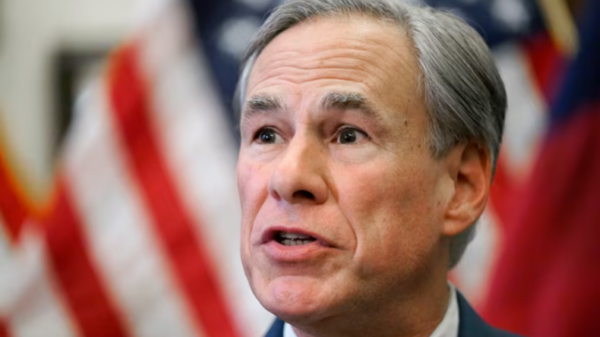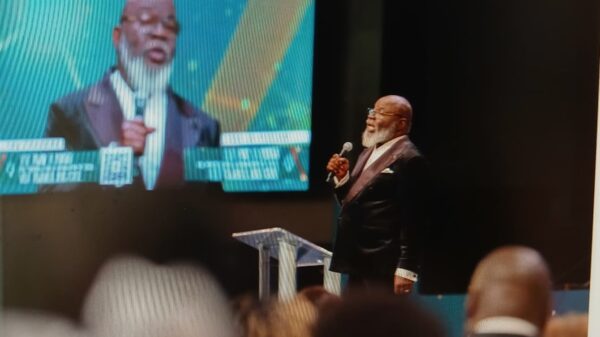Advocates for survivors of sexual violence say schools have an important role in creating a safe environment.

Chaney Tipton said she was in eighth grade when she went on her first date with a classmate — and was sexually assaulted.
At the time, she and her mom turned to a school counselor to report the incident but were told nothing could be done because it occurred off campus, they said.
Five years later, the Denton student feels she’s finally found a way to make her school officials listen.
This fall, the high school senior circulated a petition and organized a protest to share her experience with others and call for justice in her school system.
On a Friday morning in mid-October, hundreds of Guyer High School students left class, wearing blue, to join the demonstration. They chanted “Enough is enough” and carried signs that said “Silence is violence” and “Punish the RAPIST not the victim.”
Guyer’s walkout is one in a flurry of actions Texas students have taken in recent months to protest allegations of sexual assault or harassment by classmates and how school systems have responded to them.
These demonstrations spill over from calls for social justice in 2020 when many youth activists marched in protest against racial injustice after the murder of George Floyd.
Similarly, Little Elm students organized what was meant to be a peaceful protest at the high school in mid-November after a classmate shared on social media that she had been sexually harassed by a peer on the bus. That demonstration escalated with police pepper spraying students and shocking one with a stun gun.
But in the aftermath, district officials created an independent committee to review Little Elm’s harassment reporting and investigations process. An independent investigation is also underway into the incident that sparked the protest.
And in Austin, students at McCallum High School walked off campus chanting “No means no!” to raise awareness about how that district handles reports of sexual assault and harassment, according to KXAN. In response, McCallum’s principal held a community meeting to discuss resources and a new organization — called MASA – McCallum Against Sexual Assault — was formed by administrators and students.
Students have long exercised their right to protest over issues like immigration, gun violence, or sexual assault as it is part of youth activism, said Kimi King, the interim chair at the University of North Texas’ department of political science.
“What is perhaps more intense about this is that coming back from COVID, students are much more aware of the challenges that they have faced,” King said. “Greater levels of civic engagements are nothing new when there are turbulent times.”
A common thread among the recent protests is students’ belief that school districts can do more to support those who come forward saying they’ve experienced sexual assault or harassment. The need for a better system to deal with allegations drove Tipton to action.
“Schools say that the most important priority is to have a safe environment,” Tipton said. “But in that environment, it was the least safe I have ever felt.”
From eighth grade and through high school, Tipton grappled with her trauma on campus each time she encountered the student who allegedly assaulted her. She rearranged her own academic plans and attended therapy but still struggled with what she described as a system that doesn’t work to support students.
Tipton hoped officials would ensure her alleged assaulter wasn’t in her classes. But she ended up dropping a French course because it would have meant learning alongside him..
Denton school officials take every report of misconduct seriously, spokeswoman Julie Zwahr said in a statement. District personnel do not tell students that there’s nothing they can do to help them, she said.
Helping students “is what we do every single day,” Zwahr said.
“Any time a report is received regarding the safety of our students, campus administrators conduct a thorough investigation,” Zwahr said.
Should violations of the district’s code of conduct be found, administrators assign consequences, she noted. If actions are deemed to be criminal, district officials file a report through local law enforcement.
If an arrest is made, the district would immediately remove the alleged perpetrator and take precautions to protect the victims, the spokeswoman said.
Advocates for survivors of sexual assault or violence stress the need for schools to take a proactive — not reactive — role in creating a safe environment for students.
“It’s always important to remember that these incidents don’t happen in isolation and folks who may be needing support could come to someone within the school community,” said Ariel Gordon with the Rape, Abuse & Incest National Network, or RAINN. The response “will ultimately have the potential to impact that student’s ability to fully engage in school.”
The most important thing they can do to support their students is cultivate an environment where students know the available avenues for making reports and seeking support, Gordon said.
Campuses should advertise resources, such as a hotline; ways to report incidents; and ensure all staff know the steps to take if a student comes to them, Gordon said.
Students are likely to turn to trusted teachers or advisors who they have a strong relationship with, noted Ellen Wilder, a program coordinator for The SAFE Alliance, an organization that supports survivors of sexual ssault.
“The most important thing you can do is to believe and validate someone who’s come forward,” Wilder said. “You don’t know if this is the first person that they’ve disclosed the violence to. If they get the message — you’re too much or I don’t believe you or this wasn’t a big deal — it’s going to stop them from getting help again.”
Teachers don’t have to be mental health professionals to respond appropriately in these situations, Wilder said. They just have to be present, listen and validate their students.
The recent protests show that students don’t feel they are being listened to or served well, Wilder added. In response to the demonstrations, schools should sit down with the protestors to develop stronger policies together that address concerns.
Schools could implement new rules that offer students coming forward a connection to a mental health professional or start integrating curriculum about healthy relationships and signs of abuse. Texas does have a new law that requires schools to teach students about dating violence and other abuse, but parents are required to sign off on such lessons for their children to participate.
“Of course, admin can’t control individual behaviors, but there’s so much more that they can control about the aftermath,” Wilder said.
Resources
RAINN’s national sexual assault hotline is available to anyone who has experienced any type of sexual violnce and is available 24/7 at 800-656-4673. Hotline staff can either provide immediate support or connect survivors with local resources.
The Dallas Area Rape Crisis Center’s 24/7 hotline is available at 972-641-7273. All of the crisis center’s services are confidential and free of charge. Some services are available in Spanish.
The DMN Education Lab deepens the coverage and conversation about urgent education issues critical to the future of North Texas.
The DMN Education Lab is a community-funded journalism initiative, with support from The Beck Group, Bobby and Lottye Lyle, Communities Foundation of Texas, The Dallas Foundation, Dallas Regional Chamber, Deedie Rose, The Meadows Foundation, Solutions Journalism Network, Southern Methodist University and Todd A. Williams Family Foundation. The Dallas Morning News retains full editorial control of the Education Lab’s journalism.









You must be logged in to post a comment Login